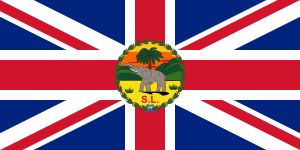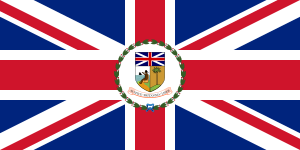List of colonial governors of Sierra Leone facts for kids
This article lists the important people who were in charge of Sierra Leone when it was a colony ruled by Britain. These leaders were called "colonial administrators." They managed the area from when the first settlement, called the Province of Freedom, was started in 1787, all the way until Sierra Leone became an independent country in 1961.
Contents
Early Leaders of Sierra Leone (1787-1792)
In the late 1700s, groups in Britain wanted to help freed slaves. They decided to create a new home for them in Africa.
The First Settlement: Granville Town
On May 14, 1787, a place called the Province of Freedom was founded. It was meant to be a new home for freed slaves. The first person in charge was:
- B. Thompson (May – September 1787)
Later, in August 1788, Captain John Taylor of the ship HMS Miro was given control of this area. However, the settlement was abandoned in 1789.
- John Taylor (August 1788 – 1789)
Restoring Granville Town
In January 1791, the St. George Bay Company helped to restart the Granville Town settlement.
- Alexander Falconbridge (January 1791 – March 1792)
Freetown is Founded
In 1792, a new main town called Freetown was established. It became the center of the new Colony of Sierra Leone. The first leader of this new colony was called a Superintendent.
- John Clarkson (March – July 1792)
Governors of the Sierra Leone Colony (1792-1827)
After Freetown was founded, the leaders of the colony were called Governors. Many people took on this role, sometimes more than once.
From Company Rule to Crown Colony
The Sierra Leone Company first governed the colony. In 1799, the "Province of Freedom" was officially renamed Sierra Leone.
- John Clarkson (July – December 1792)
- William Dawes (December 1792 – March 1794) (first time)
- Zachary Macaulay (March 1794 – May 1795) (first time)
- William Dawes (May 1795 – March 1796) (second time)
- Zachary Macaulay (March 1796 – April 1799) (second time)
- John Gray (April – May 1799) (first time)
- Thomas Ludlam (May 1799 – 1800) (first time)
- John Gray (1800 – January 1801) (second time)
- William Dawes (January 1801 – February 1803) (third time)
- William Day (February 1803 – 1803) (first time)
- Thomas Ludlam (1803–1805) (second time)
- William Day (1805 – November 1805) (second time)
On January 1, 1808, Sierra Leone became a Crown colony of the United Kingdom. This meant it was directly ruled by the British government, and the Sierra Leone Company's rule ended.
- Thomas Ludlam (1806 – July 1808) (third time)
- Thomas Perronet Thompson (July 1808 – February 1810)
- Edward H. Columbine (February 1810 – May 1811)
- Robert Bones (May – July 1811) (acting)
- Charles William Maxwell (July 1811 – July 1815)
- Charles MacCarthy (July 1815 – July 1820) (second time)
- Sir Alexander Grant (July 1820 – February 1821) (first time, acting)
Becoming Part of British West Africa
In October 1821, Sierra Leone became part of a larger group of British lands called the British West African Territories. The Governor of Sierra Leone also held the governorship for this larger territory.
- Sir Alexander Grant (February 1821 – November 1821) (second time, acting)
- Sir Charles MacCarthy (November 1821 – January 1824) (third time)
- Daniel Molloy Hamilton (January – February 1824) (acting)
- Major-General Sir Charles Turner (February 1824 – March 1826)
- Kenneth Macaulay (colonialist) and Samuel Smart (March – August 1826) (acting)
- Sir Neil Campbell (August 1826 – December 1827)
Lieutenant Governors (1827-1837)
For a period, the main leaders of Sierra Leone were called Lieutenant Governors.
- Hugh Lumley (December 1827 – 1828) (first time)
- Dixon Denham (1828 – May 1828)
- Hugh Lumley (June – July 1828) (second time)
- Samuel Smart (July – November 1828) (second time, acting)
- Major Henry John Ricketts (November 1828 – 1829) (acting)
- Augustine Fitzgerald Evans (1829–1830) (acting)
- Alexander Maclean Fraser (1830) (acting)
- Alexander Findlay (1830 – July 1833)
- Michael Linning Melville (July – December 1833) (acting)
- Octavius Temple (December 1833 – 1834)
- Thomas Cole (1834 – February 1835) (first time, acting)
- Henry Dundas Campbell (February 1835 – 1837)
- Thomas Cole (1837) (second time, acting)
Governors of the Sierra Leone Colony (1837-1961)
The title of Governor was brought back in 1837 and continued until Sierra Leone gained its independence.
- Richard Doherty (1837–1840)
- John Jeremie (1840 – April 1841)
- John Carr (April – September 1841) (acting)
- William Fergusson (September 1841 – January 1842) (first time, acting)
- George Macdonald (January 1842 – July 1844)
- William Fergusson (July 1844 – 1845) (second time)
Sierra Leone Becomes a Separate Colony Again
On January 13, 1850, the larger group of British West African Territories was dissolved. Sierra Leone once again became a separate Crown colony.
- Norman William MacDonald (1845–1852)
- Sir Arthur Edward Kennedy (September 1852 – 1854) (first time)
- Robert Dougan (1854) (first time, acting)
- Sir Stephen John Hill (1854–1855) (first time)
- Robert Dougan (1855) (second time)
- Sir Stephen John Hill (1855–1859) (second time)
- Alexander Fitzjames (1859–1860)
- Sir Stephen John Hill (1860–1861) (third time)
- William Hill and T. H. Smith (1861–1862) (acting)
- Samuel Wensley Blackall (1862–1865) (first time)
- William John Chamberlayne (1865 – February 1866) (acting)
Joining the British West African Settlements
On February 19, 1866, Sierra Leone became part of the British West African Settlements. The Governor of Sierra Leone also held the governorship for this larger group.
- Samuel Wensley Blackall (February 1866 – 1867) (second time)
- Gustavus Nigel Kingscote Anker Yonge (1867) (acting)
- Samuel Wensley Blackall (1867–1868) (third time)
- John Jennings Kendall (1868–1869) (first time, acting)
- Sir Arthur Edward Kennedy (1869–1871) (second time)
- John Jennings Kendall (1871) (second time, acting)
- Ponsonby Sheppard (1871) (acting)
- Sir Arthur Edward Kennedy (1871 – January 1872) (third time)
- John Jennings Kendall (January – February 1872) (third time, acting)
- John Pope Hennessy (February 1872 – March 1873)
- Robert William Keate (March 1873)
- Alexander Bravo and Robert William Harley (March – October 1873) (acting)
- Sir Garnet Wolseley, 1st Viscount Wolseley (October 1873 – March 1874)
- George Berkeley (March – December 1874)
On December 17, 1874, the group was renamed British West Africa Settlements.
- George French (December 1874 – 1875) (acting)
- Cornelius Hendricksen Kortright (1875) (first time)
- Sir Samuel Rowe (1875–1876) (first time)
- Cornelius Hendricksen Kortright (1876–1877) (second time)
- Horatio James Huggins (1877) (acting)
- Sir Samuel Rowe (September 1877 – 1880) (second time)
- William Streeten (1880–1881) (acting)
- Sir Samuel Rowe (1881) (third time)
- Francis Frederick Pinkett (1881) (first time, acting)
- Arthur Elibank Havelock (1881–1883) (first time)
- Francis Frederick Pinkett (1883) (second time, acting)
- Arthur Elibank Havelock (1883–1884) (second time)
- Arthur M. Tarleton (1884) (acting)
- Francis Frederick Pinkett (1884–1885) (third time, acting)
- Sir Samuel Rowe (1885–1886) (fourth time)
- Sir James Shaw Hay (1886–1887) (first time, acting)
- Sir Samuel Rowe (1887–1888) (fifth time)
- John Meredith Maltby (1888) (first time, acting)
On November 28, 1888, the British West Africa Settlements group was dissolved. Sierra Leone became a separate Crown colony again.
- Sir James Shaw Hay (1888–1889) (second time)
- William Gordon Patchett and Sydney Francis Foster (1889) (acting)
- John Meredith Maltby (1889–1890) (second time)
- Sir James Shaw Hay (1890–1891) (third time)
- John Joseph Crooks (1891–1892) (acting)
- William Hollingworth Quayle Jones (1892) (first time, acting)
- Francis Fleming (1892–1893) (first time)
- William Hollingworth Quayle Jones (1893) (second time, acting)
- Francis Fleming (1893–1894) (second time)
- William Hollingworth Quayle Jones (1894) (third time, acting)
- Frederic Cardew (1894–1895) (first time)
- J. E. Caulfield (1895 – August 1895) (first time, acting)
Sierra Leone Becomes a Protectorate
On August 24, 1895, the inland areas of Sierra Leone became a British protectorate. This meant Britain protected and controlled these areas. The Crown colony was then renamed the Sierra Leone Colony and Protectorate.
- Frederic Cardew (August 1895 – 1897) (second time)
- James Cassamaijor Gore (1897) (acting)
- J. E. Caulfield (1897) (second time, acting)
- Sir Frederic Cardew (1897–1899) (third time)
- Matthew Nathan (1899) (acting)
- Sir Frederic Cardew (1899–1900) (fourth time)
- Caulfield (1900 – December 1900) (third time, acting)
- Sir Charles King-Harman (December 1900 – October 1904)
- Sir Leslie Probyn (October 1904 – 1910)
- Sir Edward Marsh Merewether (1910–1913) (first time)
- Claud Hollis (1913) (acting)
- Sir Edward Marsh Merewether (1913–1916) (second time)
- Sir Richard James Wilkinson (March 1916 – 1921) (first time)
- John C. Maxwell (1921) (acting)
- Sir Richard James Wilkinson (1921 – May 1922) (second time)
- Sir Alexander Ransford Slater (May 1922 – September 1927)
- Sir Joseph Aloysius Byrne (September 1927 – 1929) (first time)
- Mark Aitchison Young (1929–1930) (acting)
- Sir Joseph Aloysius Byrne (1930 – May 1931) (second time)
- Sir Arnold Wienholt Hodson (May 1931 – July 1934)
- Sir Henry Monck-Mason Moore (July 1934 – May 1937)
- Sir Douglas James Jardine (May 1937 – July 1941)
- Sir Hubert Craddock Stevenson (July 1941 – September 1947)
- Sir George Beresford-Stooke (September 1947 – December 1952)
- Sir Robert de Zouche Hall (December 1952 – September 1956)
- Sir Maurice Henry Dorman (September 1956 – April 1961)
The Road to Independence
In 1961, Sierra Leone finally became an independent country, no longer ruled by the United Kingdom. After independence, the main representative of the Queen in Sierra Leone was called the Governor-General of Sierra Leone.
See also
- History of Sierra Leone
- President of Sierra Leone
- List of heads of state of Sierra Leone
- List of heads of government of Sierra Leone
 | James Van Der Zee |
 | Alma Thomas |
 | Ellis Wilson |
 | Margaret Taylor-Burroughs |



